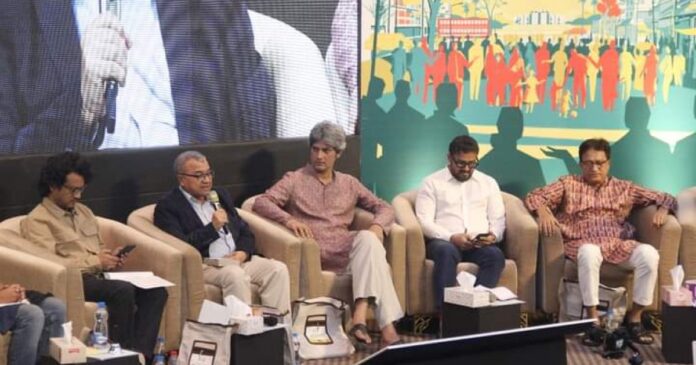Writer and professor Salimullah Khan considers the houses of Dhaka to be neo-colonial architecture. He said that the houses in Dhaka are not more than 9 and a half feet floor. It is neo colonial architecture. People are trapped in shells. There is no footpath in Dhaka where there are no shops. Where hawkers are doing something or other. Syndicates everywhere.
He said these things at the two-day 'Nyyya Nagar Ishtehar' program organized by River and Delta Research Center and Just Urban at Press Institute of Bangladesh (PIB) auditorium in the capital on Wednesday (November 20) afternoon. In the event, he presented a paper on the topic of 'Equitable distribution of civic benefits and building transparency-based cities under local leadership'.
Stating that the residential areas of Dhaka have become commercial areas, Salimullah Khan said that a residential area called Dhanmondi was made in Dhaka. No one uses the word abashi now. Dhanmondi only. It is now a commercial area. Earlier there was Motijheel commercial area, Dilkusha commercial area. What was a river, it was cut and made into a lake. Corruption did not happen in one place. It's been everywhere.
Salimullah Khan also said that they have not kept a primary school site in the entire area (Dhanmondi residential area). Three and a half khata, five khata plots. Three katha plot for three thousand taka, five katha plot for five thousand taka many of my university professors got this house. But the university professor did not say there will be primary school places for our children. There will be a public library. Now various schools are being built in Dhanmondi area by renting residential plots.
Professor Salimullah Khan said that in 1971 the population of Dhaka was 1 million. Now it is said to be two crore or two and a half crore. Population increased 20 to 25 times. This huge population in a small geographical area has now become like a large-scale prison.
Jonaid Saki, chief coordinator of Mass Solidarity Movement, said at the event, “When we look at politics in Bangladesh, there is an omnipresent predatory political system.” Then the appearance of the city is supposed to be like this. It is very difficult to change this situation while maintaining a system of widespread looting. It is possible to pave the way, as the student-worker-mob uprising has done, if we can transfer the control of politics from the hands of these looters to those who will represent the people.
General Secretary of Jatiya Samajtantrik Dal (JSAD) Shahid Uddin Mahmud (Swapan), Vice President of Garment Workers Trade Union Jolly Talukder, Chairman of River and Delta Research Center Mohammad Ejaz and Spokesperson of Anti-Discrimination Student Movement Omama Fatema also participated in the discussion moderated by PIB Director General Farooq Wasif.

